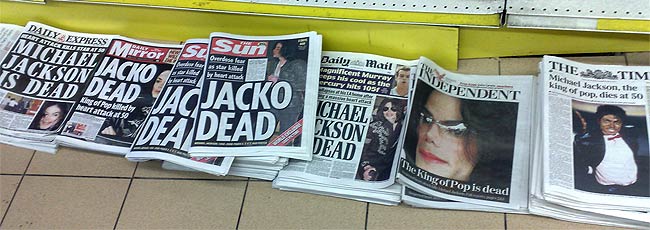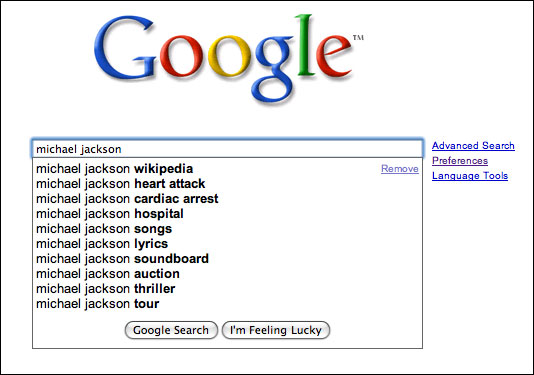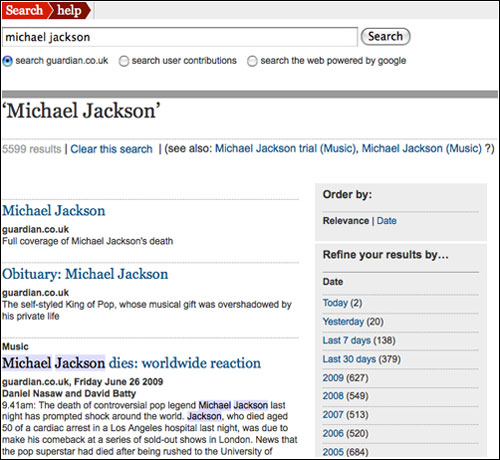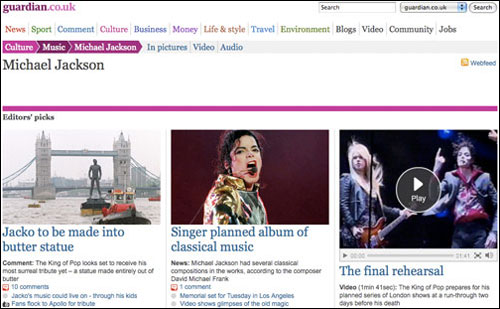Michael Jackson and search at The Guardian
With the memorial service over, it looks like we'll now gradually see diminishing amounts of column inches devoted to Michael Jackson. I wanted thought to put down some of my thoughts about what the reaction to his death tells us about search on the Internet, and on news sites.

There were a lot of articles looking at the reaction of search engines to the news. This is always one of the cases that fascinates me about the whole problem of delivering search and journalism in a digital era. I saw one article that suggested Google had done a bad job of handling the news because there had been a delay of over three hours before "michael jackson heart attack" started appearing as an auto-suggestion in the search drop-down box.

Our expectations have changed significantly.
I can remember that after the September 11th terrorist attacks on the USA there was consternation that, even after the world had watched the twin towers collapse on television, a search on Google for 'world trade center' turned up links promising webcam views from the top of the building. That really was the impetus for all of the search engines to concentrate on injecting more real-time news into their results.
It is an edge case though.
I can think of only a handful of events over the last decade where breaking news has been so dramatic that our existing search methods appear to be producing the 'wrong' results.
I'm fairly certain, though, that if our search engines slavishly shoved every net rumour in our faces as part of our results set, we'd soon tire of Google telling us that 'the Internet has reported that Jeff Goldblum or Rick Astley might have died, and we thought we'd tell you immediately just in case it later turns out to be true'.
Here is how search for Michael Jackson played out at The Guardian.
On the Thursday night as I went to bed I mentioned to my wife that I'd seen some rumours flying around Twitter that Michael Jackson had been taken ill or had even had a heart attack. In the morning, despite being a hyper-connected kind of person, the confirmation of his death was broken to me in a delightfully old school fashion - my wife heard the news on the radio and came and told me.
I fired off a quick email to our web production desk, asking them to make sure that the editor's recommendations at the top of our search results were pointing to the Michael Jackson keyword page and our Michael Jackson obituary for a range of likely keyword phrases.

Two things were reassuring about that.
Firstly, without even checking, I was able to (rightly) assume that even if we hadn't had a 'Michael Jackson' keyword tag the night before, we would have already created one by early that Friday morning, and that we would already have published an obituary online. Secondly, the email I got back was to the effect that the team were already way ahead of me in sorting it out.

Matthew Cain wrote an interesting blog post speculating as to why none of Michael's tracks had reached #1 in the singles chart after his death. The Guardian's search logs were another chart Jackson didn't top. On Friday 26th June, Michael Jackson was unable to dislodge 'iran' as the news topic most searched for on the site.
One last thing that caught my eye - I was charmed to see that Bing has a back-end switch simply called 'news go big'.
Great article Martin.
Interestingly Yahoo became both a distributor and a reporter for this story, even sending their own staff to interview, take photos and twitter.
What I wonder would traditional media reps think of Yahoo's interest in producing news data and not just posting news provided to Yahoo?
I have also noticed a number of new domains with Michael Jackson in the url.
Not sure if they will have any long-term value once the search numbers have dropped.